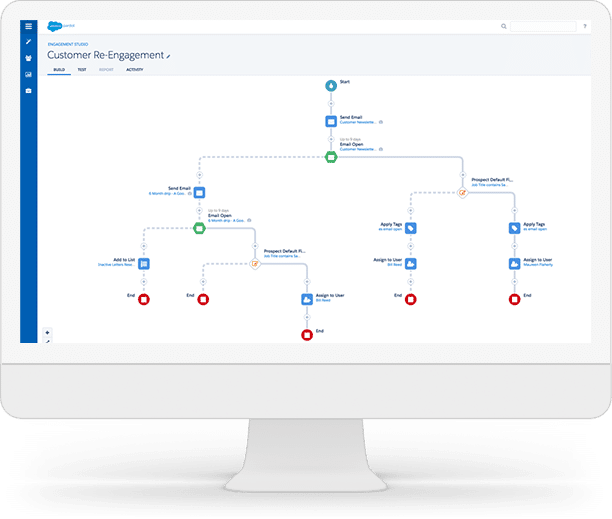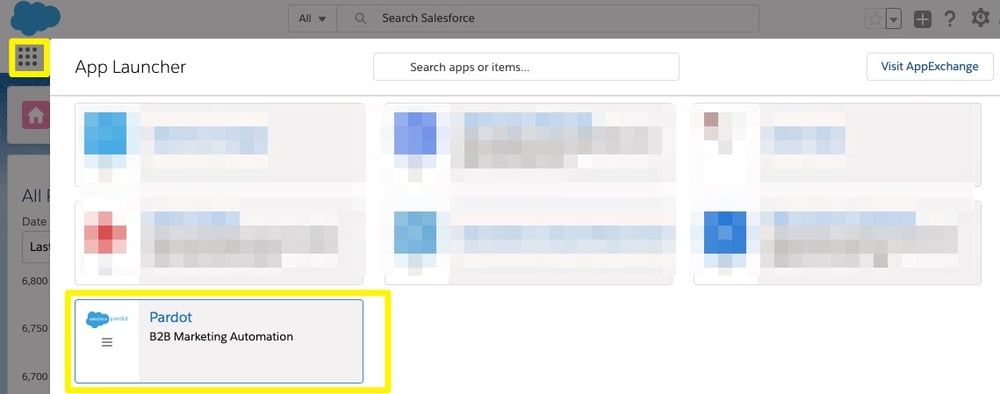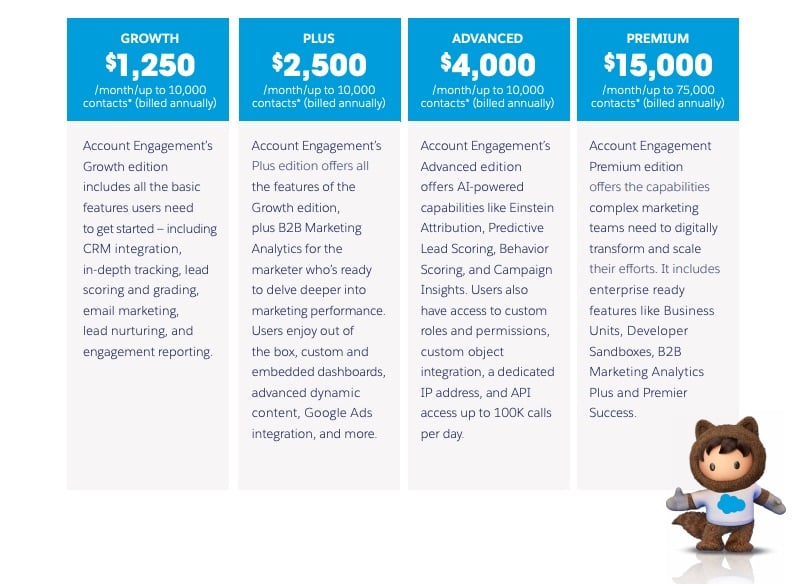Pardot is a B2B marketing automation solution built on the Salesforce CRM platform. It allows businesses to create and manage marketing campaigns, track website visitor behaviour, and nurture leads through the sales funnel.
In this post, we'll cover a handful of simple bullet point-driven answers to outline exactly 'What is Salesforce Pardot'. Feel free to jump down the list.
What's the difference between Salesforce Marketing Cloud and Salesforce Pardot?
Salesforce Marketing Cloud and Salesforce Pardot are both marketing automation platforms, but they have different features and capabilities.
People are often confused by the fact that Salesforce Marketing Cloud and Pardot are both marketing automation software platforms offered by Salesforce. So which one do they choose?
Salesforce Marketing Cloud
Salesforce Marketing Cloud is a comprehensive marketing tools that offers a wide range of features and capabilities, including email marketing, social media marketing, mobile marketing, web personalisation, and more. Salesforce Marketing Cloud is designed for enterprise-level businesses and has a wide range of integrations with other systems.
Salesforce Pardot
Salesforce Pardot, on the other hand, is a B2B marketing automation tool that is built on the Salesforce CRM platform. Pardot is designed specifically for B2B businesses and offers features such as lead management, lead nurturing, lead scoring, and marketing campaign management. Pardot also provides analytics and reporting tools to track the performance of campaigns and measure return on investment (ROI).
In summary, Salesforce Marketing Cloud is a more extensive platform that offers a broader range of features, while Pardot is a more focused solution for B2B marketing automation. The choice between the two depends on the size of your organisation and your specific marketing needs.
What's included in Pardot?
Marketing Campaign Management
- Create and manage email campaigns, landing pages, forms, lead management and lead-scoring models.
- Built-in analytics and reporting tools to track the performance of campaigns and measure ROI.

Lead Nurturing
- Automatically send targeted, personalised communications to leads based on their behaviour and engagement.
- For example, if a lead visits a specific page on a website, Pardot can automatically send them an email with related content.
Integration with Salesforce
- Align marketing and sales teams. Easily track leads through the sales process and assign them to the appropriate sales teams.
- A complete view of customer interactions across multiple channels, including email, social media, and website behaviour.
- Users access Pardot through the Salesforce App Launcher as ‘Pardot – B2B Marketing Automation’.

Integration with other systems
- Pardot can be integrated with other systems such as Google Analytics, LinkedIn, and Marketo.
- Allows businesses to gather data from multiple sources and use it to make more informed decisions about their marketing strategy.
What are the common use cases for Salesforce Pardot?
Lead Generation
Pardot provides tools to create engaging landing pages and forms that can be used to capture leads from your website or email campaigns.
These custom forms capture specific information from your leads and automatically add them to your CRM.
Lead Nurturing
Pardot's marketing automation platform can be used to send targeted and personalised emails to leads.
Based on the lead's actions, behaviours, and interests, Pardot can automatically send relevant content, such as whitepapers, case studies, and product demos, to help move them through the sales funnel.
Lead Scoring
Pardot lead scoring for leads based on the level of engagement with marketing efforts. This scoring system helps prioritise follow-up and ensures that sales teams are reaching out to the most qualified leads.
Marketing Analytics
Pardot provides robust reporting and analytics tools to help measure the success of marketing campaigns.
It enables the tracking of metrics such as email open rates, click-through rates, form submissions, and conversions to see what's working and what needs improvement.
Customer Segmentation
Pardot's segmentation capabilities allow marketers to divide audiences into smaller, more targeted groups based on demographics, interests, behaviours, and other factors.
This enables marketers to deliver more relevant messages to each group and improve the overall effectiveness of their marketing campaigns.
AB Testing
Pardot provides tools to test different versions of landing pages, emails, and forms to see which ones perform best.
These tests can run on different aspects of campaigns, such as subject lines, call-to-actions, and images, to determine what resonates best with your audience and optimise marketing efforts.
What are the main benefits of Pardot?
- Pardot is a marketing automation solution that can be integrated with Salesforce to enhance marketing campaign management capabilities.
- Pardot allows marketers to create and manage various types of campaigns, such as email, social media, and web-based campaigns, within Salesforce.
- Pardot's campaign management features include tools for segmenting and targeting specific groups of leads and contacts, as well as tools for creating and scheduling email marketing campaigns, tracking their performance, and nurturing Salesforce leads and contacts.
- Pardot also allows marketers to use Salesforce data created by the sales team to personalise campaigns, such as by sending targeted emails to leads and contacts based on their behaviour and engagement history.
- Pardot also provides ROI reporting and analytics on campaign performance, helping you to see what works and what doesn't.
- Pardot also allows for A/B Testing in order to optimize your campaigns and to see which elements are performing better.
- Pardot also allows for easy lead nurturing and scoring, allowing you to see which leads are most likely to convert and target them accordingly.
- Additionally, Pardot allows for easy lead generation with forms and landing pages and tracking of visitor activity.
What are the main limitations of Pardot?
- Pardot is a B2B customer engagement solution and might not be the best fit for B2C companies.
- Pardot's pricing can be high for some small and medium businesses.
- Pardot does not have a built-in CRM, so it must be integrated with Salesforce CRM or another CRM system.
- Pardot's analytics and reporting capabilities are limited compared to some other marketing automation tools.
- Pardot's lead scoring can be basic, and may not be as robust as other platforms.
- Pardot's forms and landing pages are limited in design and customisation options.
- Pardot's email editor is limited in design and customisation options.
- Pardot's automation rules can be limited in options and flexibility.
- Pardot's customer support is not as extensive as other tools that drive marketing and sales efforts in one system.
What are the risks associated with using Salesforce Pardot
There are several risks associated with using Pardot, including:
- Data privacy and security: As with any cloud-based solution, there is a risk of data breaches and unauthorized access to sensitive customer information.
- Dependence on Salesforce infrastructure: Pardot is built on the Salesforce platform, so if there are any technical issues with Salesforce, it can affect Pardot as well.
- Integration challenges: Integrating Pardot with other systems and applications can be complex and time-consuming, and may require the assistance of a consultant or developer.
- User adoption: Pardot is a complex tool that requires training and a certain level of technical expertise. This can make it difficult for users to fully adopt and utilize the platform effectively.
- Cost: Pardot can be expensive, especially for small to medium-sized businesses. It also requires a Salesforce license, which can add to the overall cost of the solution.
Overall, it's important to carefully assess the risks and benefits of using Pardot before making a decision to implement it.
What are the alternatives to Salesforce Pardot
There are several alternatives to Pardot if you're looking for a marketing automation software. Some popular options include:
- HubSpot Marketing Hub: A comprehensive inbound marketing platform for lead generation, nurturing, email marketing, and analytics.
- Marketo: A cloud-based platform for lead management, email marketing, and analytics.
- Eloqua: A marketing automation platform for lead generation, nurturing, email marketing, and analytics.
- Infusionsoft: A marketing automation platform specifically for small businesses with lead generation, nurturing, email marketing, and e-commerce features.
- SharpSpring: A cloud-based platform for lead generation, nurturing, email marketing, and analytics.
Which one you choose will depend on your business needs and budget.
What does Pardot Cost?
The cost of Pardot varies depending on the specific package and the number of users. Pardot offers four main packages: Growth, Plus, Advanced, Premium.
Each package includes different features and capabilities, and the cost increases as the package level goes up. Marketing automation, landing pages, email campaigns and lead management are universal across all packages.
Additionally, the pricing is based on the number of contacts in the database and the number of users that will be using the platform. The more contacts and users, the higher the cost.

We recommended checking Pardot's official website for the most up-to-date pricing information. But here is a guide taken at the time of writing this post.
The pricing for Pardot starts at $1,250 per month. Pardot has four different plans:
- Growth $1,250 p/m (up to 10k contacts)
- Plus $2,500 p/m (up to 10k contacts)
- Advanced $4,000 p/m (up to 10k contacts)
- Premium $15,000 p/m (up to 75k contacts)
Pardot also offers a pricing model called 'Pay as you grow,' which allows businesses to purchase additional contacts in blocks of 1,000 as needed. This allows businesses to scale their usage of Pardot as their business grows.
In summary, the cost of Pardot varies depending on the package level, the number of users and the number of contacts in the database, and Pardot also offers a Pay as you grow pricing model for businesses looking to scale their usage of the platform.
Final thoughts
Pardot is a good choice for marketing automation software and email marketing tools if your business model is B2B. And even more so if your sales teams are using Salesforce CRM already. The addition of marketing automation can shorten sales cycles when used effectively.
The Pardot and Salesforce CRM integration offers a wide range of features and tools that can help businesses increase efficiency, improve lead generation and conversion rates.
However, costs for large databases (more than 10k contacts) can be prohibitive. In this case, we suggest HubSpot Marketing Hub. It integrates seamlessly to Salesforce CRM, and the cost of ownership is more palatable.






